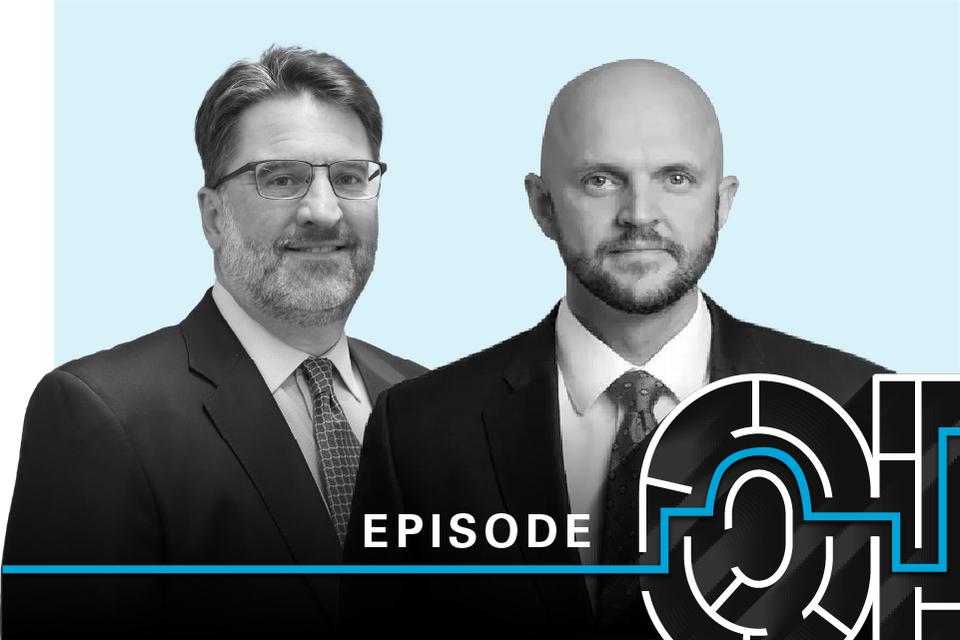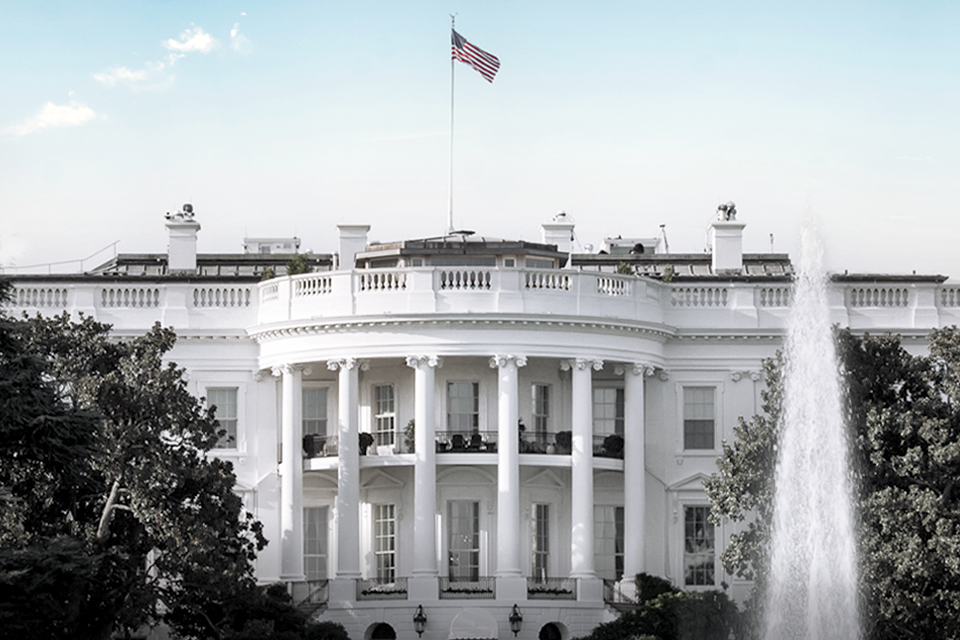01: The fate of tax incentives for the energy transition
An exploration of Trump’s policy agenda and the hurdles it may face

“The First 100 Days” is a podcast that explores the legal, regulatory and policy implications that the new US administration may have on global businesses across industries. Hosted by Executive Committee member Eric Leicht, the series features our lawyers’ views on the topics that matter most to our clients.
An exploration of Trump’s policy agenda and the hurdles it may face

Will tariffs help rewrite the rules of international trade?

Speed bumps on the road to a lower carbon future

Economic tools advance US foreign policy and national security goals

How “America First” policies may impact mineral and hydrocarbon supply chains

Some, but not all, investors may face a friendlier climate


Managing the legal impacts of a new US administration


An exploration of Trump’s policy agenda and the hurdles it may face
Listen and subscribe
This episode features a conversation with tax partners Jeffrey Davis and Michael Sykes, who explore the fate of energy transition tax incentives under the new US administration. In his practice, Jeff advises on the development and financing of renewable energy projects and the energy transition. Michael's practice focuses on tax incentives and related financing strategies for a wide range of energy transition projects. Topics covered in this episode include Section 45X of the IRS Code, introduced by the Inflation Reduction Act, which provides renewable energy tax credits. The partners consider historical precedents, including lessons from Trump’s first term, and analyze the likelihood of changes to these incentives under the new administration.
Listen now
Listen and subscribe Apple Podcasts | Spotify | YouTube Music | Amazon Music
Eric Hello and welcome to “The First 100 Days,” a podcast from White & Case that features our lawyers’ views on the likely regulatory, legal and policy implications of the new administration on businesses operating across the globe and in various industries. I’m Eric Leicht, a member of the Firm’s Executive Committee and a partner in our Debt Finance practice. Today, I’m joined by Jeff Davis and Mike Sykes, White & Case Tax partners based in our Washington, DC office. We’ll be discussing tax incentives for energy transition and their possible fate under the new administration. Jeff and Mike, thank you both for joining. To open things up, can you give our listeners a quick overview of your practices and areas of expertise? Jeff Sure. Thanks, Eric. I’m happy to start off. I’m Jeff Davis. My practice focuses on the development and financing of renewable energy projects and the energy transition, which includes tax credits and other incentives. I’ve been working in the energy sector for my entire 30 years of practice, with over 25 of those focused on renewable energy. So, I’ve been through several administrations and have witnessed firsthand the evolution and growth of the renewable energy industry. Mike My name is Mike Sykes. I’m a little bit newer to this space. Started working in the energy transition space after some time at the United States Tax Court, where I was able to work on a couple of cases that were relevant to a lot of how these tax partnerships are structured for purposes of monetizing these tax benefits. And then, shortly after that, I started working on the pre-IRA tax equity structures for sponsors, developers, investors, things like that, mainly solar and wind and carbon capture projects. And then I got the wonderful benefit of the Inflation Reduction Act that got passed in 2022. And it was like a turbo-charged button for everything in this space to sort of go gangbusters. Eric Great. Thank you both. As many of us know, Trump signed a record 42 executive orders on his first day back in office. These included one entitled Unleashing American Energy. What exactly does that order cover? Jeff So, that executive order has been described as terminating the Inflation Reduction Act of 2022. Now, during our podcast today, we’ll refer to it as the IRA, which is what it is frequently called in the United States. But that’s not really a fair description. The executive order doesn’t go that far. Instead, what it says, or what it requires, is that federal agencies pause the disbursement of funds that have been appropriated through the IRA. It specifically mentions funding for electric vehicle charging stations, which is not surprising given a lot of the things that President Trump said about electric vehicles on the campaign trail. It also requires that federal agencies review their processes, policies and programs for issuing grants, loans, contracts or any other financial disbursements of appropriated funds. Mike So, the Inflation Reduction Act of 2022 is the largest historic investment in energy transition that we know of. We’re looking at roughly $373 billion committed to energy transition and energy transition projects. Now, we know that around $30 billion of that was for these DOE grant loan programs. But the other $343 billion is in these different kinds of tax incentives and tax credits, tax monetization opportunities. So, when you look at that, and you know that developers are relying on these tax credits to pay for projects, and a lot of them will expect this to provide up to 50 percent or more of the financing for these projects, I think the big takeaway is this is expected to produce more than a trillion of new activity in the energy transition market in the US over the coming years. That much activity brings a lot of money, brings a lot of jobs. And I think that President Trump would recognize and be in favor of new money coming into the US market, new money coming into energy growth and energy independence in the US. And to the extent that these sort of flow in that direction, I think that, you know, we’d look at a lot of them being retained if they’re consistent with those sort of principles. Jeff I think one other point worth noting is, you know, while the initial scores were for that $370 billion number, the actual uptake has been much greater than expected. You know, this is going to be a lot more expensive than anticipated. Eric Mike, you must be on the horn regularly with clients trying to understand the potential impact on their businesses. What kinds of concerns are you hearing from them and how this may affect them? Mike I certainly am hearing a lot of questions from clients, and people who are, quite frankly, looking to get into this space. As we noted, the Inflation Reduction Act, the IRA, created a tremendous amount of incentive for new actors to get in and start investing money. We’ve seen upwards of $300 billion invested in the US in the energy transition since the IRA was passed. And so, a lot of these folks are wondering, is this going to reduce tax credits? Is this going to take away the opportunities that we were relying on? Many of these sponsors and developers are expecting to be able to get as much as 50 percent of capex required to build a project to come from these tax incentives. So, they want to know, is that percentage going to get reduced? Are they going to go away? Is there some other type of financing they’re going to need to secure? And from most of the people who’ve been in the industry for a long time, the general perception is, these credits have been around well before the current administration. And in fact, they existed, to a certain extent, in the prior administration, as far as solar and wind and energy transition tax credits. So, we don’t expect them to go away any time soon. But it is certainly on the table that there could be changes to how they’re sort of administered. Jeff Eric, let me jump in and add one key point about this executive order. It specifically applies to disbursements of funds that are appropriated through the IRA. One of the questions we’re getting a lot from clients is, “What is the impact on tax credits?” Tax credits aren’t appropriated, and they’re not really a disbursement of funds. So, you know, our view, based on what we know so far, is that the executive order will not affect the tax credits that exist under the IRA. Eric I’m going to pivot here a bit. Arthur Schlesinger talked about the imperial presidency back in the 1970s. Trump appears poised to press the limits of presidential authority. Is there another way for Trump to accomplish a full repeal of the credits under the IRA? Jeff I think a full repeal of the Inflation Reduction Act is highly unlikely. You’ve got to start with the fact that it is statutory law, a law that was passed by Congress and signed by the President, and therefore to repeal it, it will literally take an act of Congress. Now, it is true that, since the election, Republicans have retained control of the US House of Representatives. They also have gained control of the US Senate. So, the concern about the prospect of a repeal continues to get a lot of chatter. But I think you’ve got to keep in mind that, first of all, the provisions of the IRA have been wildly popular. They’ve also received broad bipartisan support and been on the books for many, many years, at least portions of them. In addition, there are a lot of the credits and other benefits under the IRA that greatly benefit red states. And by red states, we’re referring to those that typically vote Republican. In addition, Speaker of the House Mike Johnson has stated, pretty flatly, that he thinks it would be impossible to blow up the IRA. In that regard, 18 Republican members of Congress sent a letter to him last fall basically expressing the same thing. It’s also worth noting that the IRA benefits more than just the renewable energy and energy transition companies. It benefits oil and gas companies. It benefits manufacturing companies, as well as a lot of the newer technologies or companies that are dealing with things like carbon capture, renewable fuels and hydrogen. So, I think a full repeal is really unlikely, and instead think that you’ve got to use a scalpel instead of a sledgehammer, which means going in and surgically removing or modifying targeted provisions of the IRA. Mike Yeah, Jeff, I think that makes a lot of sense. I think there is going to be a lot more working together on these issues than people may have initially thought. Eric All right, so it seems unlikely that the IRA is going to be ripped up. The changes should be more targeted in nature. But, from your perspective, what’s safe and what may be on the chopping block? President Trump has repeatedly attacked the EV credit, for example. Why does he have it out for the EV credit? Jeff Eric, great question with respect to the credit for electric vehicles. I think first it’s worth taking a step back and remembering what President Trump has said during his campaign. During a visit to an auto parts plant, he said that the Section 30D tax credit for electric vehicles would spell the death of the American automobile industry. In addition, I think he views the credit for electric vehicles as being expensive and also anti-capitalistic because it essentially subsidizes electric vehicles at the expense of traditional vehicles, including those that have so-called internal combustion engines—or ICE—cars. Trump also, he’s been very loyal to American labor, and says it’s impossible to be both loyal to American labor and loyal to environmental groups. In addition, you know, it’s worth noting that electric vehicles typically take fewer workers than ICE cars to manufacture. Another point is the fact that electric vehicles are arguably good for China, because in order to make the batteries that are critical to the electric vehicles, you need a lot of critical minerals, many of which are being sourced from China. So, you know, as a result, I would expect that some repeal, or more likely a modification, to the EV credit will be considered as part of, perhaps, broader tax reform legislation. Eric Jeff, Trump also seems to be targeting offshore wind. I heard him talking wistfully about the death of whales and birds on one recent stump speech. What can you say about wind farms? Jeff With respect to wind farms, there are two broad buckets of wind farms. There’s the offshore wind, which you just referred to, but there’s also the onshore wind. Now, interestingly, Trump has imposed a freeze on leasing and permitting for wind farms. And that particular freeze applies not just to offshore wind but also to onshore wind. Now, admittedly, the industry had already been bracing for pushback from Trump, and we’re expecting that there would be some slowing or maybe even halting of activity in the offshore wind sector. But this freeze obviously extends to onshore wind as well. Now, first, with respect to offshore wind, in order to develop or build a wind farm on the outer continental shelf, you have to get a lease from the Bureau of Ocean Energy Management—or BOEM. Because that’s a government agency and they control the ability to hand out those leases, you can expect that the development of offshore wind farms will be effectively halted, at least in the short term. Looking onshore, this freeze will also affect wind farms located on federal lands, as well as, I think, pretty much every other wind farm, because the Federal Aviation Authority has the authority to approve anything that’s higher than 200 feet. So, most turbines today are significantly higher than that. In addition, the Interior Department now has to review options for terminating or amending existing wind energy leases. So, depending on how that is implemented, and these other freezes and restrictions, it really could have a significant impact, arguably crippling, on the wind industry. But, in the meantime, it is going to slow investment and development. Eric Mike, let me go to you. We’ve talked about some vulnerable credits. Are any credits safe or maybe safer on a relative basis? Mike I think, generally, there’s a few things to think about there. The first is how these credits function and what would be an actual outlay of funding from the US government, like what’s going to make the US government have to write a check, as opposed to what is just going to be something that one entity moves on a balance sheet for tax liabilities to another entity, right? So, things that are sort of on the block, I would say, would be direct pay, for example, where the US government is actually going to be issuing a check to certain producers or certain participants and credit regimes, right? Advanced manufacturing credits, hydrogen production, certain aspects like carbon capture and sequestration. Some of these credits that could actually qualify for direct payments, I think, would be more at risk than some of the other credits. For example, energy production credits that are based on, did you actually do this economic activity? And then instead of the US government having to write you a check, are you really just shifting or moving the benefit from one entity to another? So, things like solar credits, things like energy storage, things like production tax credits for wind. I think we may even see new types of production credits that come out. I think in one of the speeches that I heard recently, President Trump said “clean coal” maybe around ten times in a sentence and a half, right? So, we used to have a tax credit for refined coal, which included a technology that you would spray onto coal so that when it goes into boilers, it has lower emissions. So, being able to produce energy in a way that is conducive to the energy transition. And I think a lot of this stuff is about reliability, energy security, what can we sort of stockpile or what can we produce and then export? So, anything that’s along those lines, I think is probably a little bit safer. Eric Mike mentioned advanced manufacturing production tax credits. Can one of you elaborate on what those are? Jeff Sure. I’m happy to do that. So, the Advanced Manufacturing Production Tax Credit is one of the many credits that was new under the Inflation Reduction Act, and it was codified in Section 45X. So, a lot of people just refer to it as the 45X credit. It provides a tax credit for the manufacturing in the United States of components that are used for solar, wind and battery storage, you know, so think about turbines, towers, solar panels, racking, the batteries and cells used in battery storage, as well as critical minerals. And the purpose of that provision was to basically try to promote the US manufacturer of those products so that we’re less dependent on imports. And that obviously has the benefit of creating jobs in the US. And that onshoring manufacturing and creating jobs in the US have both been key points of Trump’s platform. And I think you combine that with the fact that, based on some recent Politico analysis, nearly two-thirds of the new factories that are benefiting from 45X are located in Republican districts. It could very well be that the 45X credit is pretty safe. Another credit we haven’t talked about at all is the credit under Section 45U for nuclear production. That’s one that so far there hasn’t been a lot of uptake on. But, given the incoming Secretary of Energy’s background in nuclear and the fact that Trump has previously vocalized support for nuclear, as well as his sort of all-of-the-above approach on energy, that’s one where I think we might see increased interest, if nothing else. Eric So, what about solar and wind credits? They’ve been on the books for a long time and have survived multiple expirations and extensions with broad bipartisan support. Mike I think solar needs to become more effective, and the hope is that it will be. But I think, to that point, we’re really looking to supplement and use every opportunity to produce energy that we can. It’s not necessarily about getting rid of certain types of energy production as much as it might be using everything to be more efficient. So, solar energy production’s going to be a huge part of the future. But that doesn’t de-emphasize the desire to move into things like nuclear energy production, right? Micro nuclear reactors, clean hydrogen production, different types of fuel production, really everything that can come to the table, and help us find more efficient and better ways to produce energy. Jeff I’ll also add that President Trump, both in his prior administration and on the campaign trail, said that he believes in a so-called all-of-the-above approach to energy. In addition, his pick to lead the Department of Energy, Chris Wright, has a similar view and, in fact, has worked in the solar energy industry. I think that they’ll probably be okay with keeping solar credits on the books for at least some period. Eric Thanks, Jeff. So, I’m a finance lawyer, so planning and budgeting are absolutely critical for my practice and for my clients. Say that I’m in the middle of constructing a project, having relied on tax credits under the IRA to ensure the viability of a project. If aspects of the IRA or the related tax credits are repealed, how’s that going to impact my project? Jeff The financiers, whether they are lenders, construction lenders, permanent lenders, or, you know, as we’ve talked about earlier, tax equity investors, others who are providing capital to promote the construction and development of these projects, they’re all likely taking a step back and wondering, okay, you know, what is the possible impact there could be as a result of the Trump administration? So, one of the things that we’re already having a lot of conversations around is change in tax law provisions. So, for example, while a lender may go ahead and sign a commitment, that commitment may be subject to conditions precedent. One of those conditions precedent might be that there has not been a change of tax law because that would impact the tax credits. Those tax credits, in turn, might be the source of capital to repay that lender. Similarly, with tax equity investors, they’re expecting their returns from the tax credits. So, if the tax credits go away, then that source of capital is similarly going to go away. And the same thing with transferability. A purchaser of tax credits would be expecting that the credits will actually be around, because they’re not going to buy nonexistent tax credits. So those will be some of the immediate impacts. But then, thinking, you know, more broadly about how might Congress, if Congress decides to act, approach the potential repeal or modification of provisions of the IRA. First of all, if history is a guide, the changes probably won’t be retroactive. Now, that’s not to say that Congress can’t make retroactive tax law changes. They have done that before, but it’s pretty rare. And it’s rare, in part, because Congress doesn’t want to upset expectations. And, where people have undertaken certain behavior based upon rules that Congress has put in place, it would be unfair for Congress to then pull the rug out from under them. Instead, I think what we’ll probably see, if there are going to be changes, is that they would be prospective and perhaps with, you know, some safe harbor or grandfather provisions. So, to your example, Eric, if you’ve already started construction on a project, that project’s probably going to be safe. The question then becomes, okay, what does it mean to have begun construction? Congress probably will do like the IRS has done, which is look to whether or not you’ve really made an investment, whether or not you’ve really committed to build or develop that project. And if you have, then I would expect that Congress would protect that through some sort of grandfather provisions. You know, another way that Congress may go at this is by reinstituting the phasedowns or the phaseouts, which is kind of what we were already in prior to the passage of the IRA. Both the Solar ITC and the Wind PTC were already subject to the phasedowns where, depending on when you began construction, you might have a lower value of tax credit. Eric Great. That’s a significant relief to hear that. If I have a contractual obligation, to have the rug pulled out from under me would be extremely painful. Mike, why don’t I go to you? You said that Trump can’t unilaterally repeal laws that have been passed by Congress and signed by Biden, which would presumably apply to the IRA. What about administrative guidance, issued under the Biden administration, such as Treasury regulations or other regulatory type guidance? Mike So, there are a few different things that could realistically happen with respect to guidance that’s recently been issued. A lot of that is through either the Administrative Procedure Act, if they want to challenge guidance that has now become a final legislative rule. But also, there’s the Congressional Review Act that effectively gives Congress the right to look back at certain pieces of guidance that have been issued and, if they see something about it that they don’t like, they can propose a challenge to it. And if Congress ultimately agrees, they can take that guidance off the books as though it never existed. So, in addition to that, one of the things the President can do is have agencies that are in the process of giving some of these guidelines, for how we’re going to administer things like manufacturing of goods in the US that are going to be used for renewable energy projects, stop issuing new guidance. Or if there are pieces of guidance that anyone is waiting on in those areas, and he effectively stops the issuing of new guidance, that kind of halts a lot of this. But it’s important for everybody to remember that the administration’s only going to be four years. So, if we’re thinking about certain projects that have long lead times, you know, maybe they can weather any sort of storm that exists for this four-year hiatus and continue. kind of, planning, expecting that energy transition is a global movement. It’s not going anywhere. And the US generally tries to lead in any of these big initiatives, especially where there’s a lot of opportunity to develop and grow an economy. So, chances are, it’s going to come back around. Eric What can we say at this point about future tax and energy developments based on Trump’s chosen cabinet appointees? Jeff So, first, looking to the Department of Treasury, President Trump has picked Scott Bessent to serve as the Secretary. He’s a fund manager who also was an economic advisor to the Trump campaign. He, as the top Treasury official, will be in charge of setting tax policy, including with respect to the tax incentives for renewable energy and energy transition. It’s worth noting that one of his top advisors is a former top tax advisor to House Speaker Mike Johnson, who will be moving over to the Treasury Department. Moving to the Department of Energy, President Trump has picked Chris Wright to be the Secretary. Chris Wright has sort of the same philosophy as President Trump, which is to take an all-of-the-above approach to energy. He’s the CEO of Liberty Energy, which is an oil and gas company. But, notwithstanding that, he’s also got experience and a background in geothermal, nuclear and solar. So, you know, would expect that he will have a broad view of, you know, how we want to support energy in the US, and one of the goals of President Trump is to bring down the price of energy because of his view that energy is one of the chief drivers of inflation over the last few years. So, he certainly has a goal of trying to bring down the price of electricity. Eric Great. Thanks. And what about the Internal Revenue Service? What action has Trump taken there so far? Mike Well, I don’t think it’s as much about what we’ve seen from Trump so much as the former Commissioner of the IRS, Danny Werfel, took a step down from the role, and that’s something that we hadn’t seen previously. Jeff You know, the Commissioner, kind of like the Director of the FBI, is appointed by the President for a term that is longer than his administration and, as you sort of suggested, typically you have holdovers. Mike So, it will be curious to see what happens on the inside, right? We’re going to have this new administration. We’re going to have new agendas, new initiatives. And I think right now, from what I’m hearing on the inside, folks are really kind of just waiting to see how this is all going to play out because some of them are just uncertain what the new administration, what the new IRS is going to look like moving forward. Eric So, I’ve also read there may be hiring freezes going on at the IRS. Any implications that you see of that? Mike One of the things that I think has happened, is, for example, a lot of current law students who were looking to get hired out of the Honors Program into the IRS. It’s my understanding that all of those positions have been frozen. And I don’t think that’s ever happened before. Jeff The students that are in the Honors Program are typically among the best and the brightest. It’s prestigious to be part of that program and to be hired into the IRS permanently. If those people are off looking for other jobs, what does that mean for the pipeline of top caliber people to work at the IRS? But the hiring freeze is broader than just the IRS. It’s instituted across all agencies, with certain exceptions. But what’s interesting is that, with respect to the IRS, it’s not limited to 90 days. It is indefinite. And it requires that the Treasury Secretary, in consultation with the Department of Governmental Efficiency— or DOGE as it’s now being called—has to determine that it’s in the national interest to lift the freeze. So, you know, in that regard it’s worth mentioning, you know, we’ve been talking a lot about the IRA. The IRA initially allocated $80 billion for the IRS. $20 billion of that got cut back. But a lot of that money for the IRA was intended to go towards positions for enforcement. And with the cutbacks and now the hiring freeze, we’ll expect less activity on the enforcement side, or at least in terms of hiring. As the IRS tries to staff up to be able to put out additional guidance and things of that sort, it could have a meaningful impact. Eric So, both of you have seen a number of administrations come and go. You know, we hear a lot of bluster from Trump. So, for a client, top takeaways? Do you think that this administration will lead to revolutionary changes in your business? Mike I think, one of the great lines that I heard or read right after the election was, the election is over, but the world is not. I think that really kind of captures a lot of what we expect in the energy transition space in the market in the US. Yes, we have a new administration. We’re expecting there are going to be changes. We don’t expect that this is going to completely overhaul or get rid of all of the development and growth that the industry has had to this point. So, I think it’s going to continue moving forward. Jeff One thing I would say is that President Trump is a businessman and he is a negotiator. He’s always approached things through the lens of business, sort of with an economic bent. And he also, you know, as a negotiator, oftentimes comes out with positions that may seem really scary or outlandish, but then oftentimes is willing to come to the table and settle on something that may not be as extreme. I would expect those two things will certainly be at play here, and that while a lot in the industry are worried about the doomsday scenario, I would not expect that we’ll necessarily face that. So, you know, I think we can hope for the best. But certainly, you know, as lawyers, you know, we advise people to plan for the worst. Eric Mike, Jeff, thank you both for joining today. This has been tremendously educational for me. I’ve learned a ton about the tax equity side of our business here. And, best of luck to you both as you take a run at this in 2025. Mike Thank you so much. Jeff Thanks for having us, Eric. Eric Thanks for listening. Please subscribe in your preferred podcast app so you don’t miss future episodes. For more insights and related content from our lawyers, please visit whitecase.com. Thank you.
White & Case means the international legal practice comprising White & Case LLP, a New York State registered limited liability partnership, White & Case LLP, a limited liability partnership incorporated under English law and all other affiliated partnerships, companies and entities.
This podcast is prepared for the general information of interested persons. It is not, and does not attempt to be, comprehensive in nature. Due to the general nature of its content, it should not be regarded as legal advice.
© 2025 White & Case LLP